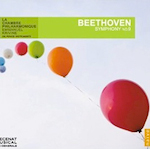We’ve reached the point where there’s no longer anything novel or revelatory about a period-performance Beethoven Ninth Symphony, and about the only thing interesting about Emmanuel Krivine’s use of chamber orchestra forces is how the woodwind detail stands out a little better against the scrawny strings. Said strings undermine the first and second movements’ impact (though not so much as the cardboard-box timpani), but it’s in the Adagio movement where their mewing sound really begins to grate on the nerves.
To his credit, Krivine chooses apt tempos, and he phrases the music in a familiarly Beethovenian manner. He’s got plenty of energy too–but he can’t overcome the textural and dynamic limitations (and Beethoven is all about dynamism) of his orchestra. The finale’s opening scampers about like so many nervous critters before coming to the excellent baritone solo by Konstantin Wolf. Dominik Wortig’s mushy tenor doesn’t impress, but the Chambre les Éléments chorus sounds pleasingly full-bodied. The recorded sound emphasizes the bass, which gives an intermittent sense of body and solidity to the orchestra. If you really need a “period” Ninth, you’ll be better served by Gardiner, or Norrington’s recent Hänssler recording.
































